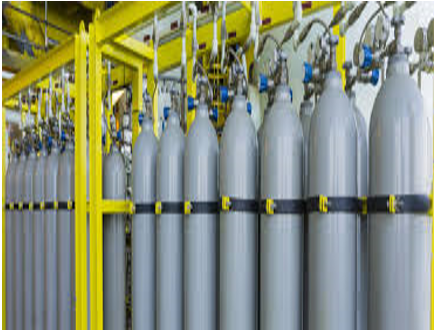INP-WealthPk
Muhammad Luqman
Pakistan has become self-sufficient in producing key industrial gases such as oxygen, nitrogen, and argon, meeting the needs of its domestic industries. The country was a net importer of industrial gases a few years ago. In an interview with Wealth Pakistan, Hafiz Farooq Ahmad, Chief Executive Officer of Ghani Chemical Industries, said, “Five industrial units of various companies in the country are producing 600 to 700 metric tons per day of these gases. We are even exporting gases like argon.”
Ghani Chemical Industries is the second-largest oxygen-producing company in Pakistan. He said eight air separation units (ASUs) are currently operating in the country, producing oxygen, nitrogen, and argon from the air. These manufacturing units are also producing hydrogen and acetylene gases.
Air is a mixture of various gases, comprising mainly oxygen, nitrogen, argon, and other gases and water vapor. Hafiz Farooq Ahmad said his company has recently completed Pakistan’s largest and most advanced air separation unit at the Hattar Special Economic Zone. This state-of-the-art facility is capable of producing 275 tons per day of liquid oxygen, liquid nitrogen, and liquid argon.
Industrial gases are gaseous materials manufactured for use in various industries such as cement, steel, food processing, healthcare, and other sectors. The main gases include nitrogen, oxygen, carbon dioxide, argon, hydrogen, helium, and acetylene, which are used in both liquid and gaseous forms.
The rising demand for specialty gases, such as argon and rare gases (neon, krypton, and xenon), is being driven by advancements in research and technology-based industries. Nitrogen and carbon dioxide — commonly used in packaged foods to maintain freshness — are also in greater demand due to increased consumption of canned and packaged products.
According to Hafiz Farooq, only helium and certain gas mixtures are being imported, and that too in negligible quantities. He added that Pakistan exported 50 tons of argon gas to the United Arab Emirates (UAE) last year. “During the COVID-19 pandemic, Pakistan’s oxygen industry produced enough gas to meet the country’s needs. We even offered to export oxygen to India, but they declined,” he recalled.
He urged the government to introduce supportive policies for the gas industry to help expand production capacity and create exportable surpluses to tap into the world’s growing industrial gas market. “Electricity, being the major raw material, should be made available to the gas industry at affordable rates. The taxation structure should also be conducive,” he emphasized.
The business community has welcomed Pakistan’s self-sufficiency in industrial gas production. However, they call for formulating a comprehensive industrial gas policy to help the sector adopt state-of-the-art technology and increase exports to regional markets.
“Industrial gases are an essential raw material for large-scale manufacturing. The cheaper the gases, the greater the industrial output,” said Kashif Anwar, former president of the Lahore Chamber of Commerce and Industry (LCCI). He suggested that local units should be encouraged to export gases such as oxygen and nitrogen to earn the much-needed foreign exchange for the country.

Credit: INP-WealthPk













